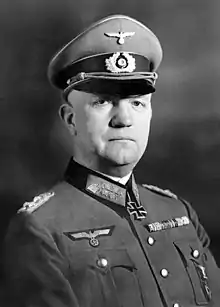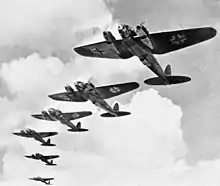Friedrich Fromm
Friedrich Wilhelm Waldemar Fromm (8 October 1888 – 12 March 1945) was a German Army officer. In World War II, Fromm was Commander in Chief of the Replacement Army (Ersatzheer), in charge of training and personnel replacement for combat divisions of the German Army, a position he occupied for most of the war.[1] A recipient of the Knight's Cross of the Iron Cross, he was executed for failing to act against the plot of 20 July 1944 to assassinate Hitler.
Friedrich Fromm | |
|---|---|
 Fromm in 1940 | |
| Chief of Army Equipment and commander of the Replacement Army | |
| In office 1 September 1939 – 20 July 1944 | |
| Preceded by | Joachim von Stülpnagel |
| Succeeded by | Heinrich Himmler |
| Personal details | |
| Born | 8 October 1888 Berlin, Kingdom of Prussia, Germany |
| Died | 12 March 1945 (aged 56) Brandenburg-Görden Prison, Free State of Prussia, Nazi Germany |
| Children | Helga Heinke |
| Military service | |
| Allegiance |
|
| Branch/service | Army |
| Rank | |
| Battles/wars | |
| Awards | Knight's Cross of the Iron Cross |
Early life
Fromm was born in Charlottenburg. He served as a Prussian Army officer during World War I.[2]
Head of the Reserve Army
In 1939, Fromm became Chief of Army Equipment and commander of the Replacement Army.[3]
When Operation Barbarossa stalled outside of Moscow in December 1941 and the Russian counter-attack started, Hitler took direct command of the Army and re-organized the armed forces' command structure. The Office of the Chief of Army Armament and the Reserve Army under Generaloberst Friedrich Fromm was created, subordinate to the commander in chief, army (head of the OKH, Hitler). Fromm had enough power at his disposal to control the German state because his position controlled army procurement and production and commanded all army troops inside Germany.[4]
At the beginning of 1942, Fromm apparently recommended going over to the defensive for the entire year because of exhausted army stockpiles and the diversion of production, after the initial successes of Barbarossa in the summer of 1941.[4]
20 July plot
In World War II, Fromm was Commander in Chief of the Reserve Army (Ersatzheer), in charge of training and personnel replacement for the German Army, a position he occupied for most of the war. Though Fromm was aware that some of his subordinates, most notably Claus von Stauffenberg, his chief of staff, were planning an assassination attempt against Adolf Hitler, he remained quiet and agreed to have a part in it in exchange for becoming a top official of the new government after the coup. However, Fromm did not have any direct involvement in the conspiracy. When the attempt to proceed with a mutiny on 15 July 1944 failed, he refused to have any further part in it.[5]
On 20 July, news broke that Hitler and several officers of the Supreme Command of the Armed Forces had become victims of an explosion in the German military's headquarters on the Eastern Front, the Wolfsschanze (Wolf's Lair), near Rastenburg, East Prussia (now Kętrzyn, Poland). Fromm quickly concluded that it was Stauffenberg and the plotters who were behind the explosion, and when he attempted to arrest them, Fromm was quickly overwhelmed and confined to a prison cell in the Bendlerblock, the Berlin headquarters of the Replacement Army, among other branches of the German military, after he had refused to join the plotters in Operation Valkyrie (they had forged Fromm's signature to begin the operation).[6]
After the coup failed, Fromm was found by men of the Ersatzheer and freed. Despite Hitler's direct orders to take the conspirators alive, Fromm held a summary court-martial of the active soldiers at his headquarters who had been identified or suspected of being part of the coup. As presiding official, Fromm condemned the officers to death and ordered their immediate execution by firing squad.[7] As for retired Colonel-General Ludwig Beck, Fromm allowed his request to commit suicide, but since the suicide attempt failed, Fromm ordered him to be shot.[8]
Arrest, trial and execution
After the Bendlerblock executions, Fromm went to Goebbels to claim credit for suppressing the coup, to which Goebbels only said, "You have been in a damn hurry to get your witnesses below ground."[9] On the morning of 22 July 1944, Fromm was arrested by Nazi officials and locked in jail to await trial. It was clear to them that his actions immediately after the coup's collapse were more likely than not to have been an attempt to use his authority, despite Hitler's specific orders to the contrary, to silence the officers directly under his operational command who might have implicated him for at least "turning a blind eye" to their activities leading up to Hitler's assassination attempt. Fromm was discharged from the German Army on 14 September 1944. The civilian Fromm was sentenced to death and considered unworthy for military duty by the Volksgerichtshof on 7 March 1945.[10]
Since the court failed to prove a direct association with the 20 July plotters, he had been charged and convicted for cowardice before the enemy. However, because he had executed the conspirators within reach, he was spared torture and execution by hanging with a thin rope, and sentenced to a military execution.[10]
On 12 March 1945, Fromm was executed at the Brandenburg-Görden Prison by firing squad as part of the post-conspiracy purge. His last words before the firing squad were reported to be "I die, because it was ordered. I had always wanted only the best for Germany".[11]
Awards
- Iron Cross (1914)
- 2nd Class
- 1st Class
- Wound Badge (1914)
- in Black
- Hanseatic Cross of Hamburg
- Honour Cross of the World War 1914/1918
- Anschluss Medal
- Sudetenland Medal with Prague Castle Bar
- Memel Medal
- Clasp to the Iron Cross (1939)
- 2nd Class
- 1st Class
- Knight's Cross of the Iron Cross on 6 July 1940 as General der Artillerie and chief of the Heeresrüstung (armament of the army) and commander in chief of the Ersatzheeres (replacement army)[12]
In popular culture
- In the 2008 film Valkyrie he is portrayed by Tom Wilkinson.[13]
See also
 Biography portal
Biography portal Military of Germany portal
Military of Germany portal.jpg.webp) World War I portal
World War I portal World War II portal
World War II portal
References
Citations
- Zabecki, David T. (2014). Germany at War: 400 Years of Military History. ABC-CLIO. ISBN 978-1598849806.
- Tyson, Joseph Howard (2010). The Surreal Reich. p. 472. ISBN 978-1450240192.
- Obermüller, Benjamin (13 January 2006). "Friedrich Fromm - nicht nur eine Figur um den "20. Juli"". rezensionen.ch. Retrieved 15 March 2014.
- Ziemke, Earl F.; Bauer, Magna E. (1985). Moscow To Stalingrad: Decision In The East. U.S. Army Center of Military History. ISBN 9780160019425.
- "Attack of the 20 of July of 1944". 26 February 2017. Retrieved 15 January 2019.
- Gregory, Don Allen (2018). After Valkyrie: Military and Civilian Consequences of the Attempt to Assassinate Hitler. McFarland. p. 36. ISBN 978-1476671529.
- Clark, Alan (1965). Barbarossa. Cassell & Co. p. 478. ISBN 0304358649.
- Simkin, John. "Ludwig Beck". spartacus.schoolnet.co.uk. Spartacus Educational. Archived from the original on 2011-08-29. Retrieved 2011-06-06.
- Mitcham, Samuel W., Hitler's Commanders: Officers of the Wehrmacht, the Luftwaffe, the Kriegsmarine, and the Waffen-SS (page 31). Rowman & Littlefield, 2012
- "1945: General Fromm executed for plot against Hitler". History. Retrieved 15 January 2019.
- Mueller, Gene: Generaloberst Friedrich Fromm. In: Gerd R. Ueberschär (ed.): Hitlers militärische Elite. Vol. 1, Primus Verlag, Darmstadt 1998, ISBN 3-89678-083-2, p. 76.
- Fellgiebel 2000, p. 188.
- "Valkyrie". IMDB. Retrieved 15 January 2019.
Bibliography
- Fellgiebel, Walther-Peer (2000) [1986]. Die Träger des Ritterkreuzes des Eisernen Kreuzes 1939–1945 — Die Inhaber der höchsten Auszeichnung des Zweiten Weltkrieges aller Wehrmachtteile [The Bearers of the Knight's Cross of the Iron Cross 1939–1945: The Owners of the Highest Award of the Second World War of All Wehrmacht Branches] (in German). Friedberg, Germany: Podzun-Pallas. ISBN 978-3-7909-0284-6.
- Kroener, Bernhard R. (2005). "Der starke Mann im Heimatkriegsgebiet". Generaloberst Friedrich Fromm. Eine Biographie. Paderborn: Schoeningh, Oler family (Alberta, Canada)
- Scherzer, Veit (2007). Die Ritterkreuzträger 1939–1945 Die Inhaber des Ritterkreuzes des Eisernen Kreuzes 1939 von Heer, Luftwaffe, Kriegsmarine, Waffen-SS, Volkssturm sowie mit Deutschland verbündeter Streitkräfte nach den Unterlagen des Bundesarchives [The Knight's Cross Bearers 1939–1945: The Holders of the Knight's Cross of the Iron Cross 1939 by Army, Air Force, Navy, Waffen-SS, Volkssturm and Allied Forces with Germany According to the Documents of the Federal Archives] (in German). Jena, Germany: Scherzers Militaer-Verlag. ISBN 978-3-938845-17-2.
External links
| Wikimedia Commons has media related to Friedrich Fromm. |
- Friedrich Fromm in the German National Library catalogue
- Lexikon der Wehrmacht
